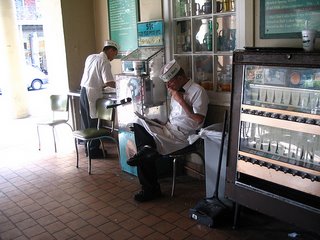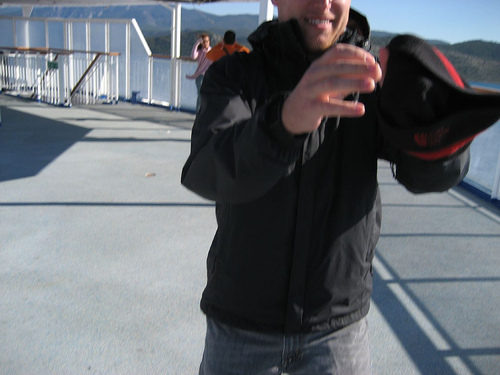
For me, of all the 300+ photos I took during my trip to New Orleans this past summer, none said more to me than this one. This guy, sitting there, on break from work, reading his paper and smoking his cigarette. For him, life is normal. He lives and works in New Orleans, one year after one of the most catastrophic natural disasters to ever strike our nation.
The city will rebuild. Its part of our human nature - we fight back against the rest of nature, we dominate it, and even though it may lash out at us from time to time, we live in a perpetual state of perceived dominance over it. People will eventually return to this city, live there, work there, worship there, and take their smoke breaks there. But it will take so much time.
Imagine the place that you live, the place where you sleep and keep all your belongings - filled to the top with muddy water. The water subsides, your belongings, what's left of them, settle to the floor after floating for so many days, scattered and broken. And then everything sits for one year. No windows, no locks on the doors, everything just sits in the humid, motionless air. Imagine the dirt caked on everything. Imagine the dank water still sitting in broken dishwashers, refrigerators turned on their sides, tubs with the plumbing clogged. Imagine the smell.
This is the house we walked into on day one of our work week in New Orleans. There were 18 of us, leaders and kids from the youth group at my church, split into two teams. Although this was not your typical international missions trip, we might as well have been on the other side of the planet - this was a disaster zone left to sit, for all intents and purposes. With my team, we helped gut 3 houses. Imagine someone going through all your things, your secret possessions, your life built up around you, tearing it all out and placing it in a pile on the street. This is what we were there to do. Family picture albums, closets full of clothes, books and bibles, jewelry, household chemicals, pornography, kitchens full of utensils, electronics, furniture, guns, everything. All in piles on the street.
They are still finding bodies to this day in New Orleans. The neighborhoods where we were still sat empty by and large - I never once worked in a house that sat adjacent to any other inhabited residence. With so many deserted homes, neighborhoods, and other uninhabited areas, I imagine they'll still be finding bodies years from now.
What amazes me most is that anyone would expect a city full of people who were totally dependent on the government - who couldn't even provide for themselves the most basic of necessities in the time of the storm, and who couldn't find even a ride to points north - that anyone would expect these same people to rebuild their entire house. To gut it, to throw out everything they once owned, to rebuild from the ground up. In one year.
One year after the 1906 earthquake in San Francisco, hundreds of thousands of displaced people had begun to move back into the city and rebuild it, but that was a different time. Nobody was waiting on the government to help - in the end, the same government that had ordered the law enforcement to shoot looters on sight was only able to establish temporary housing for some 20,000. And this was in 1906.
We live in a different era now. Now there are cities full of people that expect the government to care for them when things go bad. New York City is no different - the blackouts in Queens recently and the region at large 2 years ago provide preliminary evidence of that. Society at large relies on a system that it believes will be there for them in their day of greatest need. In that sense, we are on a razor's edge.
I believe this is the failure of the church. Our failure was not in a lack of immediate response to New Orleans, when the government failed to act, or even in the fact that the church lacked even the ability to respond to a disaster of that magnitude. The church's failure at large has been to sit idly by while a godless nation has ever so slowly but surely placed its faith in the government, not in God.
I think it was C.S. Lewis that once said, "We turn to God for help when our foundations are shaking, only to learn that it is God who is shaking them."
I wonder how much hard He's going to have to shake, before things change.
That said, we were all very glad that we went on the trip. Almost everyone expressed a desire to return and help keep rebuilding next year. And the knowledge that the need would still exist went unspoken - there is simply no question about it.
I think, most importantly, at the end of the day, our goal, whether we realized it at the time or not, was to show people what it really means to rebuild your life. We were there to help people who had seen their physical reality completely displaced. And we did. But in any place - especially a place like New Orleans - our greatest need is to rebuild the misplaced foundations of our faith. To rebuild our lives on something that cannot be shaken. I hope that in some way, some tiny little way that may never be known, we helped towards that end.

1 comment:
Thank you for coming. New Orleans is a very non-religious Catholic town - by that I mean most people claim to be Catholics, but actually follow a cafeteria version of that faith, dishing up a bit of Jesus, a spoonful of Pope, a heaping helping of Mary, and a variety of side item saints.
My church is Lakeview Christian Center, which is reformed charismatic, and we have been very blessed since the storm to serve the city and to work with crews from out of town like y'alls. The witness that Christians have given in New Orleans since Katrina is *tremendous*. It really does make a difference.
New Orleans' main problem (aside from too much faith in government as you astutely pointed out)is the local leadership. Federal money has been available for about a year, but locals have spent the last year arguing about it, and it's just now becoming available to the public. So the rebuilding that you saw is basically people's insurance money, self-financed, or church-assisted. And it's the church-assisted that really does mean the most and show people what Christianity is all about. Thanks for pitching in, because it makes people far more receptive to the gospel for long after you leave. (Our current Alpha course is *packed*!)
Post a Comment